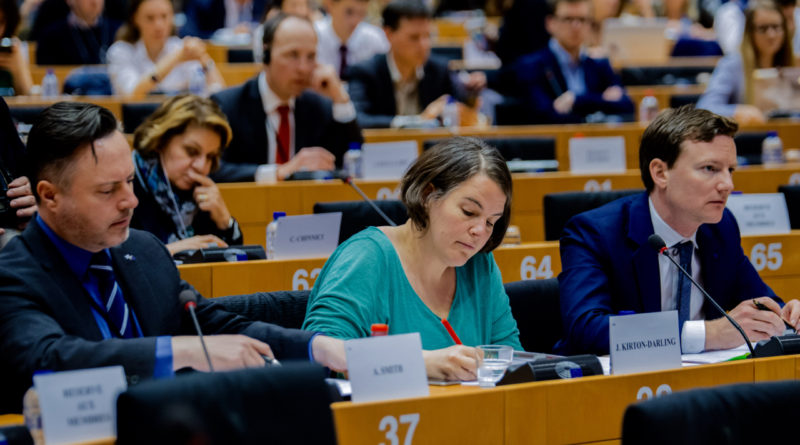Seeking solutions for people affected by Brexit: EU parliament debate
A hearing today at the European parliament laid out the problems faced by more than 4 million people whose status will be affected by Brexit.
The situation concerns some 3 million EU nationals living in the UK and 1.2 million British living elsewhere in the European Union. Their legal position in the countries where they reside will change when EU Treaties will cease to apply to Britain. This will have consequences in daily life, as EU laws cover not only the right to reside, work and set up business in other EU countries, but also the possibility to access public health services, cumulate pension contributions or bring spouses along when moving abroad.
Watch the debate.
Speakers at the conference included Anne-Laure Donskoy of the3million, a group representing EU citizens in the UK, and Jane Golding of British in Europe.
The EU position is that a deal on citizens’ rights should be negotiated at an early stage of Brexit talks, but it will then form part of the overall exit agreement.
“We fundamentally disagree with the idea that nothing is agreed until everything is agreed,” said Anne-Laure Donskoy. “We call for an early, legally binding separate agreement, preserving all citizens’ indivisible rights. This should be ring-fenced from all other items, to ensure it will continue to stand even if there is no wider agreement, or if the negotiations fail or are delayed.”
Jane Golding also talked about the indivisibility of rights, as without the recognition of qualifications or access to health services, the right of residence alone is meaningless.
Leona Bashow and Anne Wilkinson, two British citizens who have petitioned the European parliament on the loss of EU citizenship following the UK referendum, also intervened.
Since the beginning of the year, the European parliament received 22 petitions related to Brexit and EU citizenship, out of a total of 137. “This reflects the immense concern of citizens on this matter,” commented Cecilia Wikstroem, chair of the petitions committee.
“My petition argues that the EU should also stand up for the rights of British people in the UK as we are losing EU citizenship,” said Leona Bashow. She called for a legal solution so that British nationals could maintain existing rights, possibly with a cut-off date after which new Britons will no longer benefit of EU privileges. “There is no one left to uphold these rights for us. I fear a future without the protection of the Charter of Fundamental Rights, of EU Treaties and directives,” she said.
Anne Wilkinson is seeking a legal opinion on whether EU citizenship rights can be considered individual heritage and therefore not be subject to negotiation. She pleaded to keep British youth on board with the European project in the hope that the UK will re-join the EU in the future.
Jan Doerfel, a German-British immigration barrister, talked about the UK immigration law, which is more restrictive than EU directives with regard to family members from non-EU countries. This could mean a significant loss of rights for EU nationals acquiring British citizenship.
On the other hand, the EU aims to guarantee all existing rights for EU nationals in the UK for their lifetime and to maintain the jurisdiction of the European Court of Justice on this matter. Jonathan Portes, Professor of Economics and Public Policy at King’s College London, argued that it will be impossible for the UK to agree that citizens from the European Economic Area living in Britain will have more rights than British citizens. It will also be difficult to accept the jurisdiction of a European Court of Justice where the UK is no longer represented.
He proposed an immediate political declaration by which the UK and the EU will state that any new system will enable people to acquire permanent residence and will guarantee existing rights for 5 years after Brexit. Past this time, expatriates should be able to acquire citizenship or permanent residence under domestic law. Portes added that the British government should simplify the current permanent residence system and all EU countries should accept dual citizenship.
The British government had not made public proposals on these topics yet and did not take part in today’s debate.
Portes and other speakers, including MEPs Sophie in ‘t Veld, Alyn Smith, Seb Dance and Barbara Spinelli, agreed that citizens’ rights should be decoupled from other elements of the UK withdrawal agreement.
The European parliament Brexit coordinator, Guy Verhofstadt, proposed that the Assembly prepare a specific resolution on the rights of citizens affected by the British departure from the EU. This will add to the one adopted in April on the overall Brexit negotiating position. The European parliament is not directly involved in talks with the UK but will have to approve the final Brexit deal.
A study on acquired rights
Some of the proposals raised at the hearing are not legally viable, according to a recent study prepared for the EU parliament’s constitutional affairs committee.
The report “The impact and consequences of Brexit on acquired rights of EU citizens living in the UK and British citizens living in the EU-27” examines the concept of acquired rights in international law to find a solution applicable in the context of Brexit.
The study concludes that most rights linked to EU citizenship and in relation to the four freedoms of the single market (freedom of movement of goods, capitals, services and labour) will not remain valid after the UK’s withdrawal from the EU. So British citizens will effectively lose them. To be maintained “with the requisite degree of legal certainty going forward,” EU rights should be included in the Brexit agreement.
The authors of the paper, from University of Castilla-La Mancha, believe that citizens’ rights should not be separate from the overall agreement. This is because Article 50 of the Treaty speaks of ‘an agreement’, so the negotiations form a whole, according to their interpretation.
With or without a deal, the European Convention on Human Rights (which is separate from the EU) could be a means to defend the right to residence and related entitlements, as long as the it remains part of UK law.
The study also acknowledges that Brexit will have a “severe negative impact” on the rights of European citizens, whatever their situation. “It is quite understandable that many of these citizens, and others with expectations of rights, are not simply going to settle for the sudden loss of their status of European citizen […] In the absence of a reasonable agreement between the UK and the Union, we can expect the level of relevant litigation to increase substantially.”
Claudia Delpero © all rights reserved.
Photo © European Union 2017 – Source : EP.




